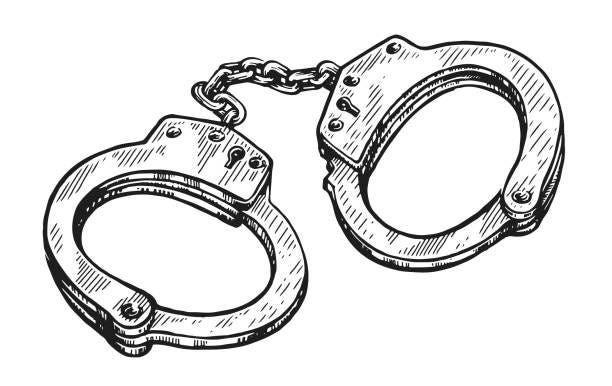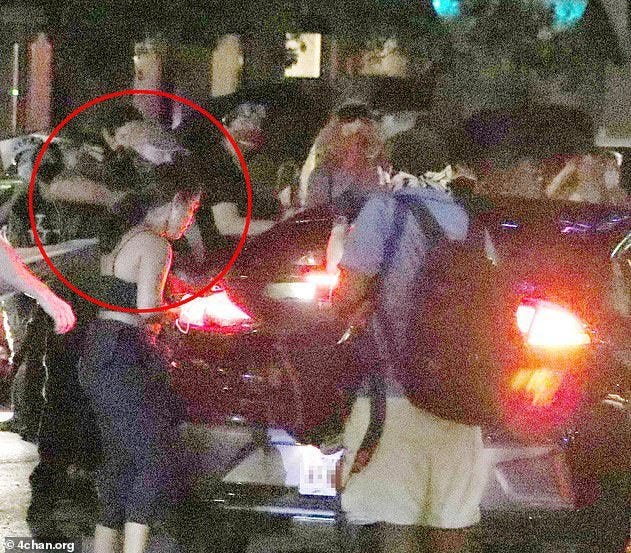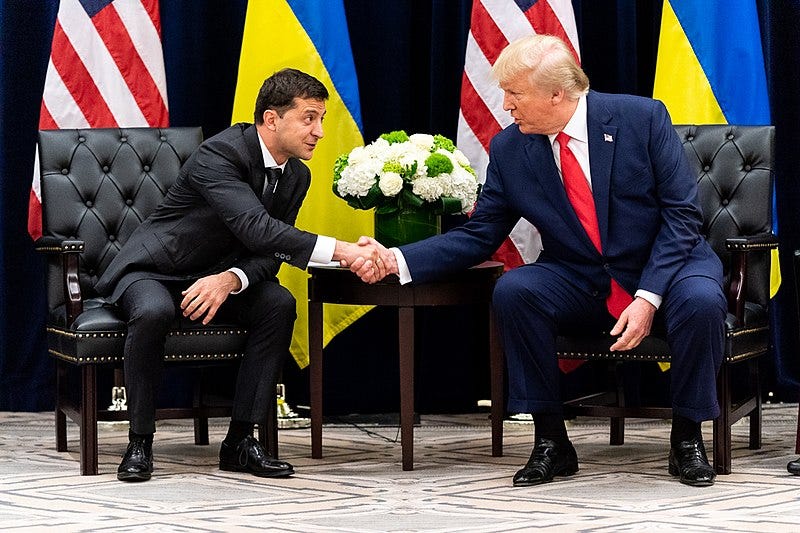What is a crime?
Our inability to agree on the definition of a crime is ripping the country apart. As criminal charges and investigations unfold for Presidents Trump and Biden, we need to find ways to lower the heat.
(Note: I mislabeled and mistitled yesterday’s newsletter. I beg your forgiveness).
Those of us processing the news that Donald Trump has been indicted, again, by a federal prosecutor have likely already made up our minds about what is going on. Putting my cards on the table, I think Trump is con man and serial liar; that his lies rise to the level of corruption and fraud; and that his enormous narcissism has let him to burn down the country in pursuit of his own glory.
This newsletter has a bit more than 15,000 subscribers and 8,500 readers, and I know a bunch of you disagree with my view. And this brings us to the central question for today:
What is a crime?
On Friday, April 7, 2023 former Army Sargent Daniel Perry was convicted of the murder Garrett Foster. He was subsequently sentenced to 25 years in prison.
On Saturday, January 16, 2016, Donald Trump, while campaigning for president in Iowa, quipped to the crowd, “I could stand in the middle of Fifth Avenue and shoot somebody and wouldn’t lose any voters, okay? It’s, like, incredible.”
The two are related.
Perry’s case is remarkable for many reasons, but the first is that Governor Greg Abbott immediately tweeted out a statement supporting Foster in the wake of his conviction, promising to do everything he could under Texas law to get him pardoned.
Let’s unpack why that support is so bizarre. Abbott isn’t the kind of governor who shows a lot of mercy to convicts. Since January 2020, he’s pardoned just 17 people, all for low-level offenses like petty theft, providing alcohol to a minor, or credit card abuse. When he does announce pardons, he does so around Christmas, so jumping into action in April is weird.
The easy explanation is that Perry’s conviction was such a complete and utter outrage that Abbott had to intervene immediately, lest Perry spend so much as one extra unearned day in prison. Abbott may have rushed to the defense of a convicted murderer because he thought there was a severe miscarriage of justice.
But was there? Abbott himself never made any reference to any kind of misconduct. He doesn’t identify problems in procedure or call out limitations of evidence or point to circumstantial factors. The closest he comes is accusing the jury of having “nullified” the state’s “stand your ground” law, which feels like flimsy cover for “reached a verdict I don’t prefer.”
Back up. Here’s what happened in Perry’s case.
On July 25, 2020, a Black Lives Matter protest was held in downtown Austin, TX. The protest was large and correctly permitted, and one of the protesters was 28-year-old Air Force veteran Garrett Foster, who was openly carrying an AK-47. In Texas, that’s legal; the gun was “draped on a strap in front of him” according to one eyewitness. Foster was exercising his First Amendment right to speech and assembly and his Second Amendment right to bear arms.
Perry was stationed at Ford Hood, but he regularly drove the 70 miles south to Austin so he could make extra money as an Uber driver. He was driving for Uber that night, and around 9:50 pm, he turned onto a street where BLM protesters were marching. He was distracted because he was texting a friend.
At this point, stories diverge. Perry contends he was surrounded by BLM protesters who were banging on his car, that Foster approached him and asked him to roll down his window, and that Foster then raised his weapon, prompting Perry to pick up the .357 Magnum handgun he kept in the center console of his car and fire several shots at Foster, killing him. In Perry’s telling, this was a classic self-defense case, a direct application of standing one’s ground in a staunch stand-your-ground state.
But witnesses do not agree with this tale. One said, “The driver intentionally and aggressively accelerated into a crowd of people.” Another said, “They were not aggravating him at all. He incited the violence.” Another pointed out they heard squealing tires — a fact backed up by tread marks — which implied Perry had hit the accelerator and headed towards the demonstrators.
More importantly, there seems to be some agreement from witnesses that Foster never raised his weapon. “He was not aiming the gun or doing anything aggressive with the gun,” one witness said, while another contends, “I’m not sure if there was much of an exchange of words. It wasn’t like there was any sort of verbal altercations. He wasn’t charging the car or brandishing his gun.” Foster’s wife, who was by his side, insists his gun remained strapped to his chest and pointed downward. Foster’s gun had the safety on at all times and did not have a cartridge in the chamber.
There’s a single photo of the incident, and it’s hard to make out what’s going on. To me, it looks like Foster’s gun is tilted toward the ground with the stock up beside his right ear and the barrel obscuring his left forearm.
Maybe more importantly, Perry himself suggested Foster didn’t point the rifle at him and only later changed his story. In his initial interview, he claimed, “I believe he was going to aim at me. I didn’t want to give him a chance to aim at me.”
And now we come to our first of several questions: what constitutes self-defense in an open carry state?
Many states now have the most permissible open carry laws they’ve had in many decades and the strongest stand-your-ground laws too. This poses an ethical dilemma. The state has said openly carrying a gun — even, or especially, in a tense situation — is acceptable. In that context, it’s very unclear how we should think about moments of hostility between two armed people — should one be lawfully entitled to preemptively shoot the other? Surely not, but this kind of dilemma is becoming increasingly common in places where perceived threats are escalating and people are reacting to those perceived threats with violence.
Tucker Carlson claimed that Perry’s conviction demonstrated, “In the state of Texas, if you have the wrong politics, you’re not allowed to defend yourself.” In a sense, he might be right, but in the wrong direction. In Tucker’s world — and Abbott’s — it was fine for Perry to shoot Foster, but not for Foster to be carrying a weapon. That’s a heck of a double standard.
With respect to Perry, an obvious rebuttal is that he had no motive. He stumbled into a tense situation and misunderstood what was happening amid the chaos. He was only trying to protect himself, not to kill someone else.
Except that there is a boatload of evidence that Perry harbored vicious animosity towards BLM protestors. Amid earlier protests, he told one friend he might “kill a few people on my way to work,” to which the friend asked, “Can you legally do so?” Perry replied, “If they attack me or try to pull me out of my car then yes.” In another instance, he remarked that a protesters needed to be removed from the streets and were destroying the country, and subsequently circulated a video of a protestor getting shot in Seattle after pulling someone out of a car, saying if that shooting happened in Texas, the shooter wouldn’t be in prison.
In May 2020, he told friends he was going to Dallas to “shoot looters” and the next month he said he was “packing heat for protestors.” Later, he posted to social media, “I wonder if they will let me cut off the ears of people who decide to commit suicide by me.” In yet another social media post, Perry complained about protesters putting cops in danger and advised to “just keep shooting them until they are no longer a threat.” He also compared BLM protestors to “monkeys” and “animals in the zoo”. We could keep going on about this, but the point is that evidence implies he was itching for a fight.
This conversation is bigger than Perry.
Daniel Perry was afforded due process. A prosecutor had to convince the 12 members of a grand jury to indict him, which they did. Then, the case went to court and lasted 8 days. Dozens of people testified and reams of evidence was submitted and parsed. The jury deliberated for 17 hours and found Perry guilty of some charges and not guilty of others. If this isn’t the way we should decide who’s guilty of murder, then what is the right way?
It’s unclear, but obviously Greg Abbott thinks there’s a better way, which is peculiar. Abbott didn’t attend any of the trial. He did not watch any of it on TV. It was not televised. There is no good reason for Abbott to claim Perry did not receive due process or that the jury was stacked against him. I can’t imagine a legal reason why Abbott should want to pardon him so badly.
But I can imagine a political one.
Daniel Perry shot a man in the middle of Park Avenue, and rather than lose supporters, he gained them. If Donald Trump is the stand-in for the everyman, the face of a struggling, neglected, oppressed middle America, the roster of Trump supporters who lined up to defend convicted murderer Daniel Perry is merely echoing the message Trump is sending about rebalancing the country along different lines.
The fact that Perry is now a rightwing folk hero is a testament to how dark and insidious our culture wars have become. The fact of the case aren’t so important as the feelings. Foster was disturbed by legacies of racism and inequality, so therefore he was by definition a leftwing terrorist. Perry, by loathing BLM protestors, must have been engaging in virtuous behavior. The prosecutor who brought the case against Perry is therefore prosecuting a martyr; he’s a lawless, Soros-funded tool of the liberal left. A jury convicting Perry is just evidence that cities are bad, for while Big City Austin liberals might persecute conservatives, surely no small town jury would do so.
Our discourse has radically evolved to the point where we no longer really care about whether or not crimes were committed; we care only about whether or not our team is winning. One lesson of the last decade’s politics is that those who disagree with you are not merely wrong; they are sub-human, and it is important to dehumanize them. Our political opponents deserve violence because their insidious agenda is a treasonous threat to this country, and so violence is not merely justified — it’s a moral imperative.
You see this logic play out all the time. Immigrants aren’t merely crossing the border illegally in search for a better life — they’re mostly rapists, drug traffickers, and criminals. Protesters aren’t merely misguided — they’re plotting to destroy the country and should be flattened by trucks. People (like George Floyd) accused of crimes deserve not only to be presumed guilty — they deserve to be abused by the police.
Damon Linker describes our new reality like this: “There must be ingroups whom the law protects but does not bind, alongside outgroups whom the law binds but does not protect.” In other words, if you’re a liberal doing liberal things, the law should protect you and not constrain you, whereas conservatives doing conservative things should be punished and bound by the law.
Consider the concept of impoundment, the legal idea that funds appropriated by Congress have to be spent in precisely the way Congress appropriated them. The Constitution creates this constraint by giving Congress the power of the purse, but it is also codified in several laws.
In the Trump years, House Democrats opted to impeach President Trump largely because he violated impoundment rules by withholding aid to Ukraine. There were 230 members of Congress who cast votes to say that Trump’s actions meant he should be removed from the highest office in the land, to which he was fairly elected, because he was circumventing the Constitution by refusing to spend money the way Congress had required.
But what about Biden? The current president has taken multiple steps to attempt to forgive, defer, or reduce student loan burdens without any permission from Congress; indeed, he has done it as Congress has strenuously objected. The courts have similar objected, including the Supreme Court, though immediately after they struck down his student debt forgiveness plan, he tried to take another bite at the apple with another dubious claim about the law.
Where are House Democrats on Biden? If violations of impoundment statutes are an impeachable offense, why hasn’t Biden been impeached? If it was enough to remove Trump from office, why isn’t it enough to remove Biden? They’re both leveraging government without permission, using financial means they were not given, to circumvent the express will of Congress. And yet — silence all around.
Keep reading with a 7-day free trial
Subscribe to Directed Divergence to keep reading this post and get 7 days of free access to the full post archives.





